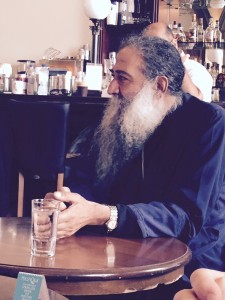Greek Orthodox project awarded for helping refugees
The Greek island of Lesbos is one of the first landing points in Europe for refugees and migrants fleeing conflicts. Many of them rely on smugglers to brave the treacherous Mediterranean in search of a better life.
Persons from non-governmental organizations (NGOs) and churches are the first people to welcome them onshore. One such organization is Agkalia (Embrace), founded by Father Efstratios Dimou, a Greek Orthodox priest. The Council of Europe awarded Agkalia the 2016 Raoul Wallenberg Prize for its work on Lesbos.

Photo: Doris Pescke / CCME
Starting in 2014 at the behest of Sweden, the Council of Europe’s Raoul Wallenberg Prize is worth €10 000. It is awarded every two years for extraordinary humanitarian achievements by an individual, group or organization.
Agkalia was founded in 2009 on Lesbos by Father Efstratios, known as Papa Stratis, who died on 4 September 2015.
“Every day between one and two hundred people come to Kalloni,” the 57-year old Orthodox priest said in an interview with the UN Refugee Agency (UNHCR) in July 2015.
“The local people tell them to come to us for help. We give them food, water, milk for the babies, shoes, clothes. They can stay here too: we have blankets, mattresses on the floor.”
The NGO has sustained support as its devoted associates pursue the endeavours of Father Efstratios.
“Only humanism and tolerance can bring better days to Europe in this dark moment,” said the representative of the Agkalia association Georgios Tyrikos-Ergas during the award ceremony.
“The European people, volunteers from so many nations who responded to our call for help, set the example of how this can be achieved — through solidarity. Utopia or not, we have seen it happening in Greece with our own eyes”.
The Council for Europe citied Agkalia’s “outstanding achievements in providing frontline assistance to thousands of refugees irrespective of their origin and religion”.
When the prize winner was announced in 2015 the jury noted that Lesbos has become a European gateway for refugees.
It hailed Agkalia as exemplary in providing temporary shelter, food, water and medical aid to people in need, assisting some 17,000 refugees and migrants from May 2015.
“As a small and flexible local organization based on volunteers, Agkalia sets a leading example of effective action by European civil society on a burning global issue,” Council of Europe Secretary General Thorbjørn Jagland said, announcing the jury’s decision.
“Agkalia’s activities reflect the fundamental values of the Council of Europe and contribute to its work to promote and protect human rights in Europe and beyond,” he added.
The award ceremony took place on 13 January at the council’s headquarters in Strasbourg.
Related links:
More information on WCC work on migration.
More information about the Churches’ Commission for Migrants in Europe (CCME)
WCC/UN conference calls for coordinated action on refugee crisis (WCC press release of 20 January)
First of 1,000 refugees arrive in Italy through “Humanitarian Corridors” project (WCC press release of 9 February 2016)
Italian Christians establish safe Mediterranean passageways for refugees (WCC press release of 17 December 2015)
Refugee crisis: Ecumenical organisations respond (Joint CEC/CCME/WCC press release of 10 September 2015)
For more information please contact:
Erin Green
Communication Coordinator
Conference of European Churches
Rue Joseph II, 174 B-1000 Brussels
Tel. +32 2 234 68 42
Fax +32 2 231 14 13
E-mail: eeg@cec-kek.be
Website: www.ceceurope.org
Facebook: www.facebook.com/ceceurope
Twitter: @ceceurope
The Conference of European Churches (CEC) is a fellowship of some 114 Orthodox, Protestant, Anglican and Old Catholic Churches from all countries of Europe, plus 40 national council of churches and organisations in partnership. CEC was founded in 1959. It has offices in Brussels and Strasbourg.




